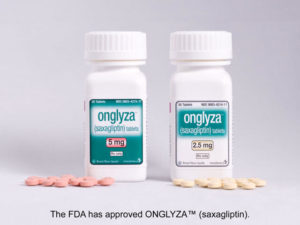
Loncar Lyon Jenkins is now investigating Onglyza side effects lawsuits related to heart failure, pancreatitis, or pancreatic cancer
If you or someone you love were among those needlessly injured as a result of taking Onglyza, you may be eligible for compensation. Loncar Lyon Jenkins is investigating cases in all 50 states. Contact Loncar Lyon Jenkins immediately for a free, confidential case evaluation using the form on the side or by calling toll free at 800.285.4878. Onglyza heart failure lawsuits are being evaluated on a contingency fee basis, meaning you pay nothing unless a recovery is obtained.

800-285-HURT (4878)Available 24/7 | 356 Days | se habla español
April 20, 2016 Update: FDA Updates Warning Label
On April 5, 2016 The FDA safety review found that type 2 diabetes medicines containing saxagliptin and alogliptin may increase the risk of heart failure, particularly in patients who already have heart or kidney disease. As a result the FDA mandated warning label changes to Onglyza and Kombiglyze to inform patients of the potential increased risk of heart failure.
December 2, 2015 Update: Kombiglyze to be Included with Onglyza
Kombiglyze contains the same active ingredient, Saxagliptin, as Onglyza but contains metformin and acts as an extended release pill. Kombiglyze was approved in 2010 and is also manufactured by AstraZeneca and Bristol-Myers Squibb. Considering the extreme similarity between Kombiglyze and Onglyza, it carries the same risks of heart failure, pancreatitis, and pancreatic cancer. Loncar Lyon Jenkins is currently evaluating Kombiglyze cases for litigation. If you were injured by this medication or Onglyza, contact our office immediately for a confidential case evaluation.

800-285-HURT (4878)Available 24/7 | 356 Days | se habla español
Onglyza: A New Class of Potentially Risky Diabetes Drug
Onglyza (Saxagliptin) is a dipeptidyl peptidase-4 (DDP-4) inhibitor belonging to a new class medications known as incretin mimetics used for the treatment of type 2 diabetes. It acts to lower the blood sugar of diabetic patients after food consumption when blood sugar levels are highest. It works by forcing the body to produce more insulin. Onglyza was first approved on July 31, 2009 as a medication to supplement diet and exercise to normalize blood sugar levels in patients with type 2 diabetes. DDP-4 inhibitors are a relatively new class of diabetes drug that have experts concerned about a lack of long-term safety studies. Manufacturers of Onglyza, AstraZeneca and Bristol-Myers Squibb, initiated a study looking to promote the heart benefits of Onglyza in order to quell concerns. Published in October 2013, the manufacturers own study furthered the concerns of experts.
Increased Risk of Heart Failure Hospitalization
The Onglyza study sponsored by Astrazeneca and Bristol-Myers Squibb published in The New England Journal of Medicine showed an increased risk of heart failure hospitalization by 27%. In a study of 16,492 patients tracked for a median of 2.1 years, the Onglyza group showed a heart failure hospitalization rate of 3.5% as compared to the placebo group with 2.8%. The increased rate of heart failure hospitalization was significant enough for the FDA to release a February 2014 Onglyza Drug Safety Communication requesting clinical trial data from the manufacturers of Onglyza to investigate a possible association between use of the type 2 diabetes drug and heart failure.
In April 2015 the FDA advisory committee voted (14 out of 15 members) that the FDA add new safety information on the higher risk of cardiovascular hospitalization to the product label. One committee member voted to withdraw the drug from the market entirely. Loncar Lyon Jenkins is continuing to monitor all data regarding Onglyza as the FDA continues to investigate the link between Onglyza and the increased risk of heart failure.
These labeling changes may impact your ability to successfully litigate your case. Do not wait to act. Contact us immediately for a no cost, no obligation review of the facts of your case.
Signs and Symptoms of Heart Failure
The mayo clinic provides the following signs and symptoms of heart failure that Onglyza patients should be aware of:
- Shortness of breath (dyspnea) when you exert yourself or when you lie down
- Fatigue and weakness
- Swelling (edema) in your legs, ankles and feet
- Rapid or irregular heartbeat
- Reduced ability to exercise
- Persistent cough or wheezing with white or pink blood-tinged phlegm
- Increased need to urinate at night
- Swelling of your abdomen (ascites)
- Sudden weight gain from fluid retention
- Lack of appetite and nausea
- Difficulty concentrating or decreased alertness
- Sudden, severe shortness of breath and coughing up pink, foamy mucus
- Chest pain if your heart failure is caused by a heart attack
When to see a doctor:
- Chest pain
- Fainting or severe weakness
- Rapid or irregular heartbeat associated with shortness of breath, chest pain or fainting
- Sudden, severe shortness of breath and coughing up pink, foamy mucus
Onglyza Linked to an Increased Risk of Pancreatitis and Pancreatic Cancer
On March 14, 2013 the FDA released a drug safety communication that they were investigating reports of possible increased risk of pancreatitis and pre-cancerous findings of the pancreas from incretin mimetic drugs for type 2 diabetes. According to a study by Butler, published in the March 2013 issue of Diabetes, one of the claims of DPP-4 drugs is that they increase the number and size of beta cells (cells that are responsible for secreting insulin). In people with Type 2 diabetes, the beta cells shrink or die and lose their ability to produce insulin. Butler and colleagues found that although the drugs did indeed increase the number of beta cells, the cells became abnormal. They also found small, benign tumors called adenomas that have the potential to become malignant. One of the key findings was that this change only occurred in Type 2 diabetes patients who took DPP-4 or GLP-1 drugs, and not in people with diabetes who took other drugs. As a result of this study, over 100 lawsuits have been filed by patients who developed pancreatitis or pancreatic cancer taking DPP-4 drugs.
If you are a patient taking Onglyza it is important that you see a doctor if you feel that you may be experiencing heart failure, pancreatitis, or pancreatic cancer. Patients should not stop taking Onglyza without the consent of their health care professionals. If you are anyone you know have experienced heart failure, pancreatitis, or pancreatic cancer as a result of taking Onglyza, you may be entitled to a significant claim against the manufacturers. Loncar Lyon Jenkins Onglyza heart failure lawsuit evaluations are free and you pay nothing unless a recovery is obtained. Contact us by using the form on the side or by calling toll free at 800.285.4878.

















